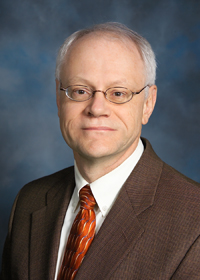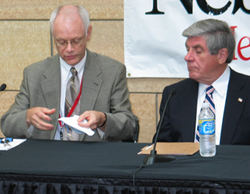 |
Steven Hinrichs, M.D., senior associate dean for research development in the College of Medicine and professor and director of the University of Nebraska Center for Biosecurity, has been named the first recipient of the University of Nebraska’s Innovation, Development and Entrepreneurship Award (IDEA). |
That’s the humble North Dakota native’s way of saying that he doesn’t deserve all of the credit for the accomplishments that have earned him the University of Nebraska’s inaugural Innovation, Development and Entrepreneurship Award (IDEA).
“I’m thrilled to receive this honor, but I’m happy because it’s a great reflection on the team that we have working together in so many areas, from the public health laboratory to disease surveillance to the basic science work related to pathology and microbiology,” Dr. Hinrichs said. “I hope everyone understands it’s not just me getting all of these things accomplished. It really takes a collaborative effort, and we have a great group of scientists and medical professionals.”
Dr. Hinrichs fills numerous roles on UNMC’s campus. He is a professor and director of the microbiology and virology laboratory in the department of pathology and microbiology; senior associate dean for research in the College of Medicine and director of the NU Center for Biosecurity, as well as the director of the Nebraska Public Health Laboratory, which is housed at UNMC.
He credits UNMC colleagues Oksana Lockridge, Ph.D., Paul Fey, Ph.D., Peter Iwen, Ph.D., and University of Nebraska at Omaha collaborators led by Hasham Ali, Ph.D. and UNL researchers Mark Griep, Ph.D., Andy Benson, Ph.D., and Khalid Sayood, Ph.D., for proposing specific ideas and then seeing those ideas through to fruition.
“In many ways, my role is to find outstanding talent, connect them to resources, and then continue to think about how we can set new goals and keep advancing our science and increase our impact,” Dr. Hinrichs said. “Our timing was fortuitous, Chancellor Maurer raised the visibility of research and we followed his leadership.”
|
|
Sam Cohen, M.D, Ph.D., chairman of the department of pathology and microbiology, said Dr. Hinrichs “has an extraordinary vision for research and development, and is unique in his ability to develop programs to attain those visions.”
Examples of this include Dr. Hinrichs’ development of several antibodies that have been licensed and marketed, and well as relatively recent findings that could lead to the development of molecular diagnostic capabilities for a wide variety of organisms, including bacteria and fungi. Several of these innovations have been patented or have pending applications and licensing agreements with companies.
Many innovations have arisen from Dr. Hinrichs’ interest in public health. He was instrumental in developing the concept for the Nebraska Public Health Laboratory to become part of UNMC in 1997, and he has served as its director since then.
In 1998, he developed a biosecurity section funded by a grant from the Centers for Disease Control and Prevention (CDC). When the first anthrax outbreak occurred in 2001, the NPHL had already developed an outreach and training program for the state. A member of the team, Tony Sambol, was asked to travel to Washington to coordinate the screening of the U.S. Post Office facilities that had been contaminated.
Dr. Cohen, who also cites Dr. Hinrichs’ abilities and accomplishments as a pathologist, credits him with having the vision for the university’s bioterrorism efforts. Dr. Hinrichs and UNMC Chancellor Harold M. Maurer, M.D., worked closely with other NU campuses, then-Lt. Gov. Dave Heineman, and other members of the state’s Homeland Security Policy Group to develop a program for public health responsiveness. One component of the work was expanded to a 10-state regional effort, the Mid-America Consortium, which Dr. Hinrichs organized together with Dick Raymond, M.D., current undersecretary for Food Safety at the USDA.
“He is in constant interaction with the CDC in extending many of the developments he has made for public health bioterrorism preparedness to a national level,” Dr. Cohen said. “As part of this preparedness, he has been leading the development of a statewide-computerized network for monitoring possible outbreaks, which could be indicative of bioterrorism attacks.
“In addition he has co-invented — with Ann Fruhling, Ph.D., at PKI — a laboratory-based telemedicine system for rural labs to have immediate access to expertise at the NPHL,” Dr. Cohen said. “The system has now been deployed in two other states. Integration with the private sector is key and that is why we have also launched inititives with 3M and Novartis and Smith.”
 |
Dr. Hinrichs displays a 3M “N95” mask as U.S. Sen. Ben Nelson looks on during a news conference last fall. Dr. Hinrichs was instrumental in forging a relationship between UNMC and 3M Corporation. |
“There are a lot of challenges ahead of us, but I believe we haven’t yet accomplished our best work at UNMC,” Dr. Hinrichs said. “Research today requires multitalented collaborations tied into a system wide strategic plan. We have a highly-productive group of collaborators in place that is working in a number of areas to improve the health of Nebraskans and people all around the world.”